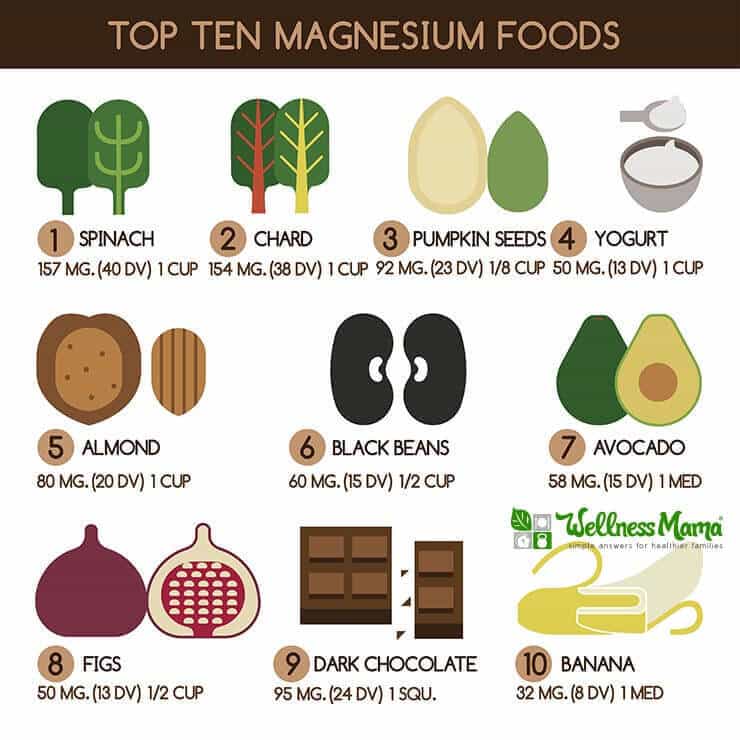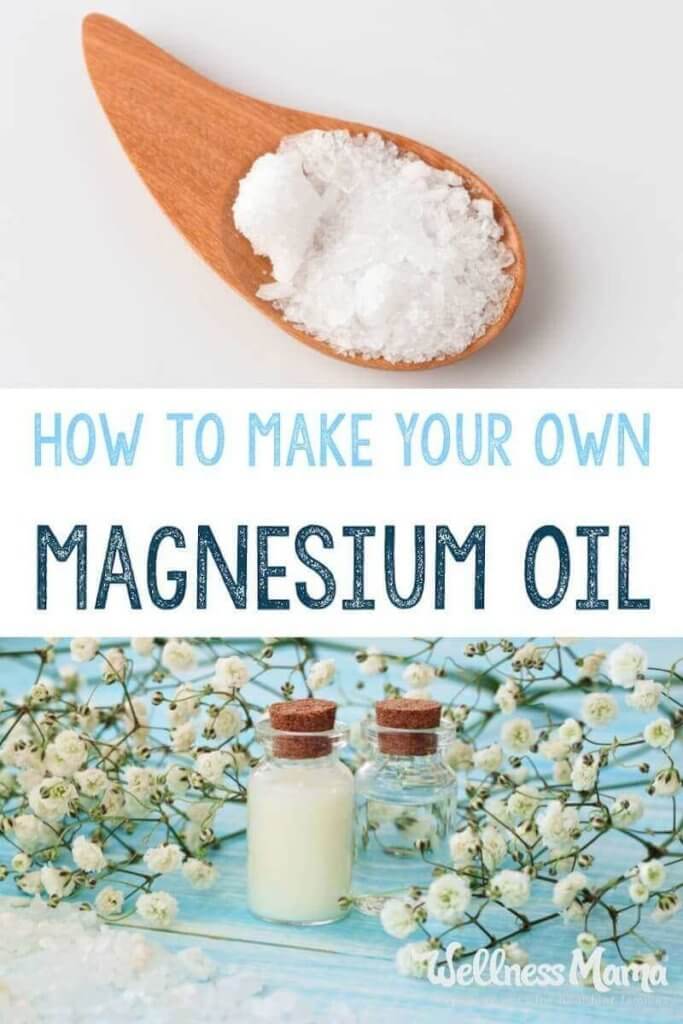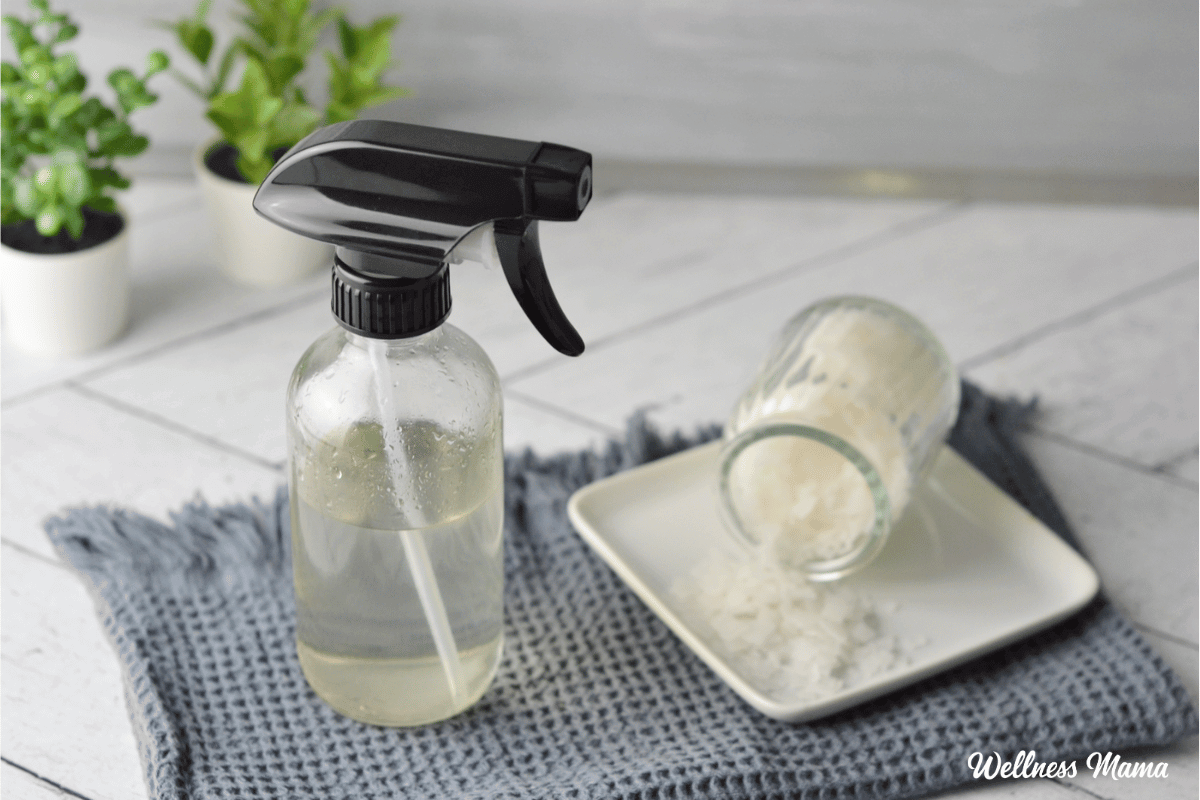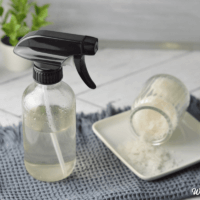Even with a nourishing, real-food diet, it’s difficult to get the magnesium we need from food alone. Magnesium is one of the few supplements I take every day and I often use topical magnesium oil spray on my skin.
Why is magnesium critical to overall wellness? Many people don’t get enough of this vital mineral that the body uses for hundreds of reactions. Every cell in the body needs magnesium in some way! It’s essential for bone, tooth, muscle, nerve, and joint health as well as for optimal sleep and stress reduction.
More sleep and less stress? Sign me up!
Why Are We Lacking Magnesium?
Magnesium deficiency is widespread because many of us have lifestyle factors that actively deplete our magnesium levels. These include lack of sleep, excess stress, or alcohol/caffeine/sugar consumption. On top of that, many natural magnesium sources are depleted. Our soil has less magnesium due to over-farming and high pesticide use. Water filtration systems also remove much of the naturally occurring magnesium in water.
The ocean is still a wonderful source of pure magnesium and trace minerals, but we don’t all have daily access to a beach. Transdermal magnesium oil is an easy and effective way to increase magnesium levels.
Benefits of Magnesium Oil
Thousands of studies involve magnesium therapy in some form. These studies evaluate this essential mineral’s effect on everything from skin health to diabetes and hypertension.
One easy way I’ve found to increase my levels is transdermally (or through the skin) with this magnesium oil. Just spray it on after a shower or a bath, let it soak in, and you’re done! It’s quick, and easy, and bypasses the digestive system for absorption.
There are also magnesium supplements that can be taken internally. I like magnesium drink mixes like Natural Calm or the ones from Jigsaw Health. Lately, I’ve also been loving this one from BiOptimizers that blends 7 different kinds of highly absorbable magnesium.
However, some people have difficulty absorbing magnesium internally. If you have trouble increasing your magnesium intake with oral supplementation, then topical use can be helpful. In my experience, it helps to cycle the two methods to ensure absorption.
Here’s why I make magnesium oil a regular part of my routine:
1. Improved Magnesium Levels
Obviously, the goal of using magnesium oil is to boost our magnesium levels. A 2010 study by the Herbal Research Centre showed over a 25 percent increase in cellular magnesium levels. Study participants used magnesium on their skin for 12 weeks. Transdermal magnesium therapy includes magnesium soaks (like foot soaks) and magnesium spray.
I consider this a basic form of nutritional insurance since it’s so difficult to get magnesium from food and water.
2. Smoother Skin
I like using magnesium oil for healthier skin along with dry brushing. I dry brush in the mornings and often use magnesium spray. This routine helps my skin stay smooth and breakout-free. People with sensitive skin should start with diluted magnesium oil and work up as their skin allows.
3. Less Muscle Soreness
Many athletes swear by magnesium for post-workout recovery and sore muscles. Even those who aren’t high-level athletes can benefit from using magnesium after workouts. Studies indicate magnesium spray may help reduce muscle soreness and replenish magnesium levels lost through sweat. I’ve also found it’s great for leg cramps and muscle cramps that can keep kids (and adults!) awake at night.
4. Fewer Headaches and Migraines
There’s a lot of research about magnesium’s importance for headache and migraine relief. Studies show people who have good magnesium levels have fewer headaches and migraines. If you feel one coming on, sometimes drinking water and taking magnesium is enough to get it to go away. This is great news for those who don’t want the side effects that come with conventional pain relievers!
5. Balanced Blood Sugar
There’s also quite a bit of research on magnesium and balanced blood sugar. This may be for several reasons. Too much sugar depletes our magnesium levels. Having unbalanced blood sugar and insulin levels may deplete magnesium. This, in turn, makes it more difficult to balance blood sugar and insulin.
Magnesium doesn’t treat diabetes or blood sugar imbalance. However, magnesium can be an important part of a holistic approach to blood sugar management.
6. Lower Risk of Blood Pressure and Hypertension
Hospitals routinely use IV magnesium as an acute treatment for high blood pressure. Most of us aren’t giving ourselves IV magnesium at home though. And until recently there hasn’t been much well-documented information on magnesium supplements and blood pressure.
A 2016 meta-analysis found that magnesium can help significantly reduce blood pressure. This analysis found a benefit at doses of more than 370 milligrams daily. So someone would likely need to supplement both internally and transdermally to get the benefit.
7. More Restful Sleep
There’s a good reason Epsom salt baths are often used for relaxation. Magnesium may have a beneficial effect on GABA receptors in the brain. This allows us to relax and sleep easily and possibly deeper. Magnesium also helps remedy restless legs at night for a better night’s sleep.
It’s important to note that a small segment of people seem to have the opposite effect and wake up after taking magnesium. These people should, of course, not take magnesium at night.
How to Use Magnesium Oil
Spray on arms, legs, and stomach daily. I use 10-20 sprays most days. It usually causes a tingling sensation the first few times you use it, which is normal. It should fade after a few times, but you can dilute it with more water if it’s bothersome.
After applying, leave on the skin or wash off after 20-30 minutes. I usually apply after a shower and then use a moisturizer or lotion bar about 5 minutes later. If the sticky feel on your skin bothers you, try applying at night before bed when you won’t notice it as much or before showering and rinse off.
This is my favorite magnesium oil formulation. If you’re the DIY type you can also make your own with magnesium flakes! When I don’t have magnesium oil on hand I’ve been known to make it! Try this easy recipe.
DIY Magnesium Oil
Equipment
- Glass measuring cup (or bowl)
Materials
- ½ cup magnesium flakes
- ½ cup distilled water
Instructions
- Boil the distilled water.
- Place the magnesium chloride flakes in the glass measuring cup or bowl and pour the boiling water over them.
- Stir well until completely dissolved, about 1 minute.
- Let cool completely and store in a spray bottle.
Notes
- I prefer to use magnesium oil after a shower and often add 10 drops of lavender essential oil for scent and relaxation. It’s a great way to get a little self-care in!
- This can be stored at room temperature for several months.
Other Natural Ways to Get Magnesium
While magnesium does have many well-documented benefits, it’s only a small part of the many nutrients we need. Magnesium supplementation is great but should be in addition to a real-food diet like nature intended!
Some foods have magnesium, though the amounts are declining due to poor soil quality and over-farming. Foods that have magnesium include:

Magnesium Oil FAQs
This post has generated hundreds of comments and questions. I’ve tried to answer the most common ones here:
Why is this called an oil when there is no oil in it?
Good question. This is actually a highly saturated mineral solution of magnesium. When it goes on the skin it feels like an oil and was named “Magnesium Oil” for this reason. Confusing? A little… but I didn’t come up with the name. Even commercial brands of magnesium oil use that term.
What type of magnesium is best?
From the research I found, magnesium chloride seems to be the most absorbable and least irritating form. It’s also easy to find some to buy. (This is the brand I use.)
Would Epsom salts work?
I find Epsom salt sprays too drying but I love Epsom salt baths. The difference is that Epsom salts are magnesium sulfate and can be more drying and not absorb as easily into the skin.
Can I use an oral magnesium supplement powder to make transdermal magnesium?
Nope! The forms for internal use are irritating to the skin. This would also leave a white film and make a big mess. I don’t recommend it.
Is it good to add calcium to the spray too?
I wouldn’t. In theory, you could and it would dissolve decently well, but it would leave a white film on the skin. And calcium isn’t as easily absorbed through the skin. Many people get plenty of calcium and not enough magnesium, so this potentially wouldn’t be as beneficial.
Can this go in a plastic bottle?
In theory yes and it should work fine. I prefer glass whenever possible, especially since glass bottles are readily available now. You can find glass spray bottles here.
Can I use this on babies/kids/my pets?
Ask your healthcare provider/vet to be sure before using any product on a child or pet. That said, I use this magnesium spray on my kids at night to help them sleep more soundly.
Can I use magnesium while pregnant/nursing?
Supplements like magnesium are generally considered beneficial during pregnancy and while nursing, but check with your midwife or doctor if you have any concerns. I’ve used it through several pregnancies with great results.
This is supposed to improve sleep, so why does it seem to keep me up?
There’s a small group of people who have an opposite reaction to magnesium. While it promotes restful sleep for many people, some have trouble sleeping for a few hours after taking magnesium. After some experimentation, I found that I’m part of this group and do better taking magnesium in the morning.
Why does this oil cause burning/tingling for some people?
One theory is that those who are deficient have a tingling or burning reaction to magnesium oil. I noticed it seemed to irritate me much more at first but I soon adjusted and didn’t have a problem with it. However, I don’t have any science to back up the deficiency theory. I also found that this particular magnesium oil didn’t tingle or burn at all.
What about adding essential oils to the mixture?
There are some risks associated with certain essential oils but some can also be very beneficial. Adding a few drops of generally skin safe oils (like lavender or sweet orange) adds a nice scent and some health benefits. As always, do your own research and ask a qualified aromatherapist for any personalized health advice.
Can this be used as deodorant?
Yep! I have a separate recipe for a spray deodorant that’s basically this recipe anyway. Even this spray on its own works great for me now. You can also try this magnesium roll-on deodorant with magnesium powder.
Have you tried magnesium to help reduce stress or improve sleep? Ever tried to make your own? Share below!




Leave a Reply